MercoPress. South Atlantic News Agency
Tag: Argentine wheat exports
-
Friday, February 7th 2025 - 07:13 UTC
Brazil needs to purchase 3,5 million tons of wheat, despite higher yields in domestic production, says CEPEA

Wheat production 2024/2025 in Brazil fell by 2.6% compared to the previous year, with the National Supply Company (Conab) forecasting a harvest of 7.89 million tons in 2024. This also represents an 11.9% reduction in the cultivated area, which shrank to 3.06 million hectares.
-
Friday, December 27th 2024 - 06:24 UTC
Russia’s influence on the world wheat market, a problem for Argentina’s exporters
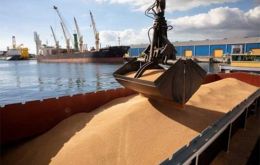
Despite declining international wheat prices, Russia has been exporting wheat at record levels this season, ahead of a quota set to take effect on February 15. The quota is part of the government’s strategy to bolster domestic supply and curb inflation, which currently stands at 9.5%.
-
Sunday, December 15th 2019 - 10:58 UTC
Rise on Argentine agrifood export taxes decreed, effective immediately

Argentine President Alberto Fernández signed a decree whereby export taxes on soy, wheat, corn and beef go up. The decree became available Saturday as it appeared in the Official Gazette and is effective immediately.
-
Thursday, August 9th 2018 - 07:02 UTC
Argentina expecting a bumper 2018/19 wheat crop of some 20m tons
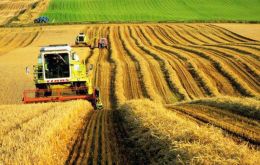
Argentine farmers are finishing this year's wheat sowing, helped by moist soils and cold weather that is prolonging the vegetative stage of crops, raising hopes of high yields and a record harvest, growers and analysts said on Wednesday. Cold Southern Hemisphere winter weather allows seedlings to grow more sprigs per plant. Harvesting starts in November.
-
Monday, February 13th 2017 - 16:41 UTC
Argentina expects at least 15 million tons of wheat from the 2016/17 crop
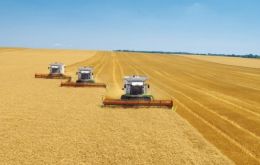
Argentine farmers are expected to harvest at least 15 million tons of wheat in the 2016/17 crop year versus 11.3 million in the previous season, Agriculture Minister Ricardo Buryaile said last week. Wheat planting in Argentina expanded dramatically when President Mauricio Macri eliminated export taxes soon after his December inauguration.
-
Tuesday, November 1st 2016 - 08:11 UTC
Argentina 2016/17 wheat production estimated at 14.4m tons and 8m tons exports

Argentina’s wheat production is estimated at 14.4 million tons in 2016-17 and total exports are estimated at 8.03 million tons, the U.S. Department of Agriculture’s (USDA) Foreign Agricultural Services (FAS) said in its latest report. The main market is expected to be Brazil, the historic, natural market for Argentine wheat and flour.
-
Thursday, June 23rd 2016 - 19:17 UTC
Argentina planting an additional million hectares of wheat this winter

Argentina is planting an additional one million of hectares with wheat this austral winter, taking the total area to 5.3 million hectares, spurred by the end of export duties and quotas, and a floating exchange rate, according to the Agro/Industry ministry in Buenos Aires.
-
Tuesday, June 14th 2016 - 08:32 UTC
Brazil and Argentina crop problems raise demand for US supplies
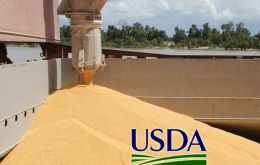
Domestic supplies of corn and soybeans will be tighter than expected in the United States as problems with crops in Brazil and Argentina have raised demand for U.S. supplies from overseas buyers, the U.S. Agriculture Department. In its latest monthly supply and demand report, the government cut its new-crop and old-crop ending stocks outlooks for both corn and soybeans by more than analysts had forecast.
-
Wednesday, May 18th 2016 - 12:07 UTC
Argentina forecasted to increase wheat area by 25% for a 15/16 million tons crop
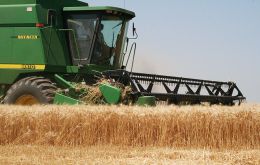
Argentine wheat exports more than doubled in the first quarter, government data showed, as farmers rushed to sell stockpiles ahead of an expected jump in plantings spurred by the open-market policies of new President Mauricio Macri. The surge in Argentine supply is hitting an oversaturated world market and putting downward pressure on wheat prices already near their lowest levels in six years.
